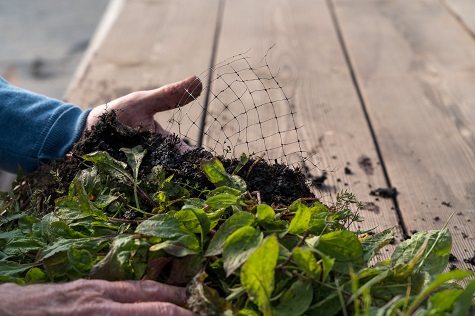
A leading UK turf grower is calling for the end of the use of plastic netting in turf - something he says is causing unseen environmental damage.
Stephen Fell (pictured above), who owns Yorkshire-based business Lindum Turf, describes the plastic netting - which is in the majority of turf sold in the UK - as a completely avoidable source of pollution, adding few British consumers even know that most turf sold in the UK contains plastic.
The call is being supported by industry body the Turfgrass Growers Association, which is encouraging its members to go plastic free by 2025.
Stephen made the call after Lindum Turf reported a threefold increase in sales of its plastic-free wildflower turf product over the past two years as the trend for replacing manicured lawns with wildflower meadows has gathered pace.
People buy wildflower turf to increase biodiversity and attract pollinators to their gardens, Stephen said, but are often appalled when they discover the product they are laying could cause significant damage to the environment.
“The trouble is, over time the plastic netting breaks down into microplastics and pollutes the soil and can leach off into watercourses,” Stephen said.

“But because the net is hidden within the turf and people can’t see it, they don’t know it is there. So, despite people having the best intentions of doing the right thing for the environment, they often don’t realise the damage choosing the wrong product can cause.
“It’s a throwback to earlier production methods the industry likes to keep quiet about. But technology has moved on. We have worked hard for many years to eliminate plastic from our turf, including our wildflower turf, and we believe it is now time for the rest of the industry to catch up.”
According to industry figures, around 70m sqm of turf are laid each year in the UK.
One argument employed by some turf growers to provide reassurance to consumers about the environmental credentials of their product is to describe the plastic ‘degradable’.
But this term often confuses consumers into thinking the plastic mesh used is biodegradable and therefore harmless to the environment.
Stephen points out the opposite is true. Whereas ‘degradable’ plastic does degrade in the ground, it does so into harmful, polluting microplastics, and not harmless organic matter.
This can cause major issues in soil and water, and for wildlife.
Stephen added: “Wildflower turf is becoming incredibly fashionable. It is the only quick, easy, and reliable way to create a wildflower meadow which not only provides a beautiful spectacle to look at, it increases biodiversity and attracts vital pollinators.
“So, to create a product with that intention, only to line it with damaging single-use plastic seems perverse to me, especially when it is possible to create sturdy, plastic-free wildflower turf. The industry needs to address this issue and pledge to remove plastic from turf by 2030 at the latest.”
According to the TGA, the vast majority of UK turf growers use some kind of plastic turf netting in some or all of their products, meaning thousands of tons of single use plastics are being buried in the ground every year.
Not only does this cause issues with microplastics getting into the environment, farmers who let their land out to turf growers are being left with bits of plastic in their fields which cause problems when growing root crops like carrots and potatoes.
Birds, hedgehogs and other wildlife often suffocate or starve to death after getting trapped in the plastic debris.